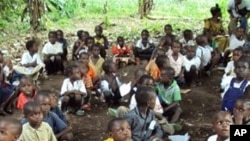The United Nations is appealing for nearly $59 million to aid more than 100,000 refugees who fled to the Republic of Congo to escape armed clashes in Equateur Province in the Democratic Republic of Congo. The appeal, which runs until the end of the year, will also be used to help 58,000 local Congolese residents.
The United Nations reports more than 80 percent of the refugees are women and children. It says they have settled in more than 100 sites along a 600-kilometer stretch of the Oubangui River between Liranga District and the border with the Central African Republic.
Lamin Manneh is Resident Representative of the U.N. Development Fund in Congo Brazzaville. He says in most cases, the refugees outnumber the local population by five to one.
"So, you can imagine the impact of the situation there of a refugee population of 114,000. It is a lot of pressure on the local resources, on bio-diversity and there is a big potential for conflict despite the fact that the local population and the government have been very, very welcoming," Manneh said.
The refugees fled from Equateur province after clashes erupted in late October. The Enyele militiamen launched deadly assaults on ethnic Munzayas over fishing and farming rights in the Dongo area.
This caused an estimated 60,000 people to flee to other parts of Equateur. Another 17,000 have sought refuge in the Central African Republic and more than 114,000 have crossed into the Republic of Congo.
A spokeswoman for the U.N. refugee agency, Melissa Fleming, says many of the refugees who had fled in October, returned home. They then were forced to flee a second time because of renewed fighting.
"We have only been able to cover, so far, 30 percent of the needs of this huge population for food, sanitation, shelter, health care and primary education ... Very difficult to access. The river is low right now. It is very difficult for us to get big boats that would help us transport all of the supplies. And, not only that, we do not have the funding for all of the supplies," Fleming said.
In addition, the United Nations notes the increase in the population is placing great strains on local resources such as water, wood, fish and wild game. It says the refugees' coping mechanisms are not enough to meet their basic needs.
More Than 100,000 Congo Refugees Need Aid
- By Lisa Schlein

Appeal to help ethnic Munzayas from DRC who fled deadly assaults over fishing and farming rights following late October clashes



